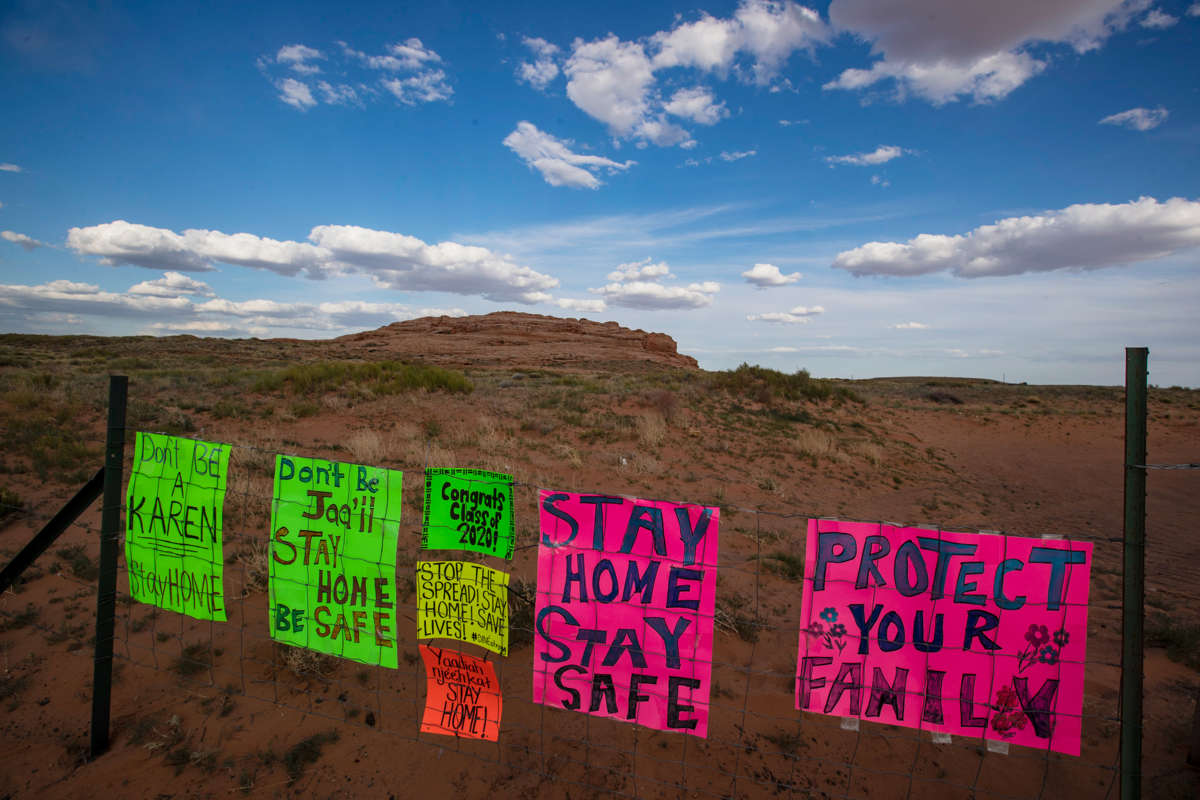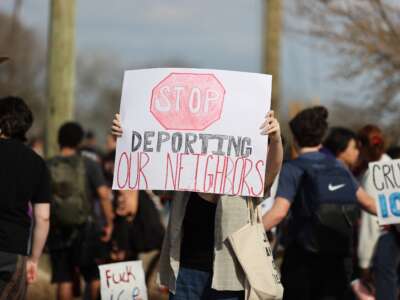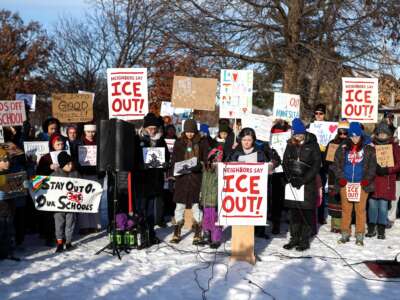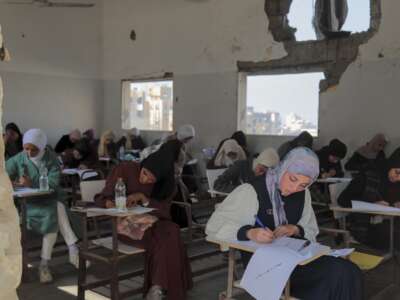Honest, paywall-free news is rare. Please support our boldly independent journalism with a donation of any size.
As students return to college this fall, Americans committed to racial equity and justice must awaken to the situation beyond the walls of their own institutions and alma maters. As usual, challenges facing predominantly white institutions are dominating public dialogue, Congressional hearings and dinner conversations.
Meanwhile, significant threats to Tribal Colleges and Universities (TCUs), lifelines to rural and disenfranchised Native American communities across the nation, are barely discussed.
This is especially problematic given the pandemic’s disproportionate impact on American Indian and Alaskan Native communities. In May, the Navajo Nation eclipsed New York and New Jersey for the highest per capita Covid-19 rate in the nation. American Indian and Alaskan Native people in states such as New Mexico and Wyoming were experiencing infections at five to ten times the rate of the general population.
As we work towards an inclusive national recovery, we must remember that the nation’s 37 TCUs are more than educational institutions – they are community and intellectual hubs, and critical avenues of support and opportunity for the nearly 100,000 students they serve. Their multifaceted missions are enduring and essential; these institutions are focused on increasing college attainment for Native Americans, nation-building and counteracting the deleterious and lasting effects government-forced assimilation.
In an environment where the popular press and influential college rankings focus attention on just 50 of the more than 4,000 colleges and universities nationwide, it is all too easy to forget about Tribal Colleges and Universities. But we do so at our collective peril.
Most TCUs operate in extremely rural settings in the Midwest and Southwest, where some students must hitchhike more than 40 miles just to get to class. Many offer much-needed internet service, providing access to some of the 35 percent of tribal land residents who do not have broadband service.
Fully 85 percent of TCU students were eligible for Pell grants, a marker for financial need, before the pandemic. Thus, if federal and state governments were committed to equity and justice in American higher education and the federal government was truly upholding its treaty and trust obligations, TCUs would receive greater support.
Instead, TCUs have been systematically and severely underfunded since their inception. The consequences of insufficient funding and support were visible even before the pandemic. TCUs typically do not receive funding from state and local governments or property taxes, and because Tribes have limited resources to support the well-being of their communities, they are usually unable to provide financial resources for operations of TCUs.
The devastating results have been visible for a long time. In fall 2019, our teams at the Hope Center for College, Community, and Justice and the American Indian College Fund partnered to field our #RealCollege survey at seven TCUs in as many states in the Midwest, Great Plains and Southwest.
We found that 80 percent of the respondents experienced food insecurity, housing insecurity or homelessness during the previous year. That rate was about 20 percentage points higher than figures for non-TCU students.
Another survey conducted by the College Fund found that same fall 2019, one in 10 students said they were at risk of leaving college due to financial concerns. By March 2020, that number had reached one in five.
Without enough food to eat or a safe place to sleep, it is very difficult to focus on school. It is therefore unsurprising that on average, 80 percent of Native American students at TCUs do not earn four-year degrees within six years or two-year degrees within three years.
Poverty rates among Native people are nearly double the rates of other groups at 25.8 percent compared to 14.1 percent, according to U.S. Census data, with affordable food and housing already in short supply before the pandemic. For example, tribal housing (a form of public housing provided primarily through federal appropriations) is under-capitalized and food insecurity in Native communities is common.
Last fall we learned that almost 70 percent of TCU respondents experienced housing insecurity in the previous year and 29 percent of TCU students experienced homelessness. A staggering 50 percent of TCU students ran short of food in the month prior to the survey, and more than one in three went hungry.
In comparison, at other types of institutions 39 percent of students experienced food insecurity, 46 percent experienced housing insecurity and 17 percent experienced homelessness.
Employment is an insufficient shield against basic needs insecurity for TCU students. Last fall’s survey revealed that 60 percent of TCU respondents who experienced food insecurity, housing insecurity and/or homelessness were gainfully employed.
Now, due to the pandemic, Tribes are dealing with an estimated loss of more than $4.4 billion in economic activity. The Hope Center’s latest survey (which did not include tribal colleges) found that nearly 70 percent of students who lost a job due to the Covid-19 pandemic experienced basic needs insecurity, as did 63 percent of students whose pay or hours were cut.
According to a College Fund survey of its students, half of the group’s scholars reported they work to support themselves or their families while attending college. We suspect the effects of unemployment at TCUs are even larger now.
As Congress works on the next stimulus package, the needs of TCU students must be at the forefront. The CARES Act provided $23 million to TCUs, a woefully insufficient amount, and the funds were delayed in reaching the institutions and students.
To address financial shortfalls that jeopardize students’ health and educational trajectory, a Student Emergency Aid Fund specific to TCUs must be established and supported with at least $40 million per year, as part of a broader package of emergency support of at least $1 billion for all minority-serving institutions.
The American Indian Higher Education Consortium is rightly calling on Congress to allocate hundreds of millions of dollars in additional support to stabilize the institutions, ensure students have digital access to an education and address long-overdue facilities repairs, technology updates and upgrades needed to bring students safely back to campuses, such as HVAC/air purification systems.
This country was built at the expense of Indigenous Americans, and the debt we owe and will probably never pay back will haunt us for generations.
We cannot sweep the lives of TCU students aside. Their struggles are our struggles. Their recovery and survival, their health, education and well-being, is the latest test of our commitment to equity and justice.
When you think of what will happen to higher education this fall, think about TCUs and Native American students.
This story about tribal colleges was produced by The Hechinger Report, a nonprofit, independent news organization focused on inequality and innovation in education. Sign up for the Hechinger newsletter.
A terrifying moment. We appeal for your support.
In the last weeks, we have witnessed an authoritarian assault on communities in Minnesota and across the nation.
The need for truthful, grassroots reporting is urgent at this cataclysmic historical moment. Yet, Trump-aligned billionaires and other allies have taken over many legacy media outlets — the culmination of a decades-long campaign to place control of the narrative into the hands of the political right.
We refuse to let Trump’s blatant propaganda machine go unchecked. Untethered to corporate ownership or advertisers, Truthout remains fearless in our reporting and our determination to use journalism as a tool for justice.
But we need your help just to fund our basic expenses. Over 80 percent of Truthout’s funding comes from small individual donations from our community of readers, and over a third of our total budget is supported by recurring monthly donors.
Truthout has launched a fundraiser to add 310 new monthly donors in the next 4 days. Whether you can make a small monthly donation or a larger one-time gift, Truthout only works with your support.














